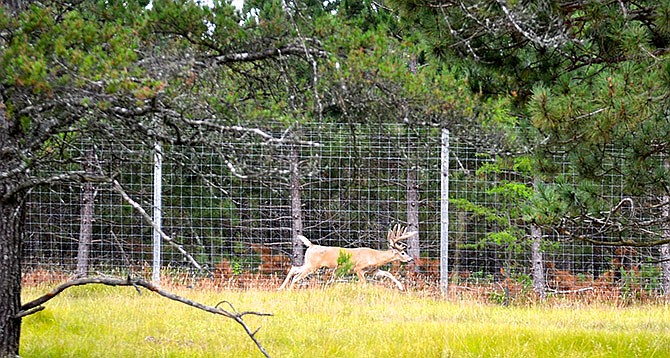Missouri's Conservation Department has the legal and constitutional authority to regulate captive deer as well as those in the wild, the Missouri appeals court in St. Louis ruled Tuesday.
The three-judge panel then transferred the case to the state Supreme Court "because of the general interest and importance of the questions involved."
The four members argued the voter-approved 1936 constitutional amendment creating the Conservation Commission gave it that authority.
The plaintiffs' lawsuit argued the Conservation Department didn't have the authority to issue or enforce regulations affecting captive deer herds and operations, because they are not "game" nor "wildlife resources of the state" as listed in that amendment.
The four-member commission in 2014 adopted new regulations aimed at fighting "chronic wasting disease," or CWD - a fatal disease that affects cervids, the class of animals that includes deer and elk, and that is spread through animal-to-animal contact or through environmental contamination.
The new regulations, set to go into effect on Jan. 1, 2015, were delayed during the court battles:
Prohibited the "possession of wildlife," including "wildlife raised or held in captivity," unless permitted by commission regulations.
Imposed fencing and confinement requirements for cervids in captivity or private ownership.
Required veterinary testing, record-keeping and reporting requirements on hunting preserves.
Mandated "only cervids born inside the state of Missouri" could be bred, held in captivity or hunted on big game preserves.
The plaintiffs also argued the regulations violated their "right to farm" under the 2014 constitutional amendment.
The case originally was filed in Gentry County in November 2014, was transferred to Osage County in February 2015 - then was transferred again in May 2015 to neighboring Gasconade County.
Osage County Associate Circuit Judge Rob Schollmeyer heard the evidence and arguments and, on Sept. 15, 2016, issued the ruling the department appealed.
Schollmeyer ruled if Conservation enforced its regulations, the businesses would "suffer irreparable harm" through lost business and loss of customer goodwill.
He also ruled the regulations would eliminate "the interstate market for captive cervids," and force the businesses to spend "hundreds of thousands of dollars" to comply with the fencing regulations.
But the appeals court determined the Conservation Commission has the regulations authority.
"Given the highly communicable nature of CWD," Judge Robert Dowd wrote, "the Commission's efforts to restore and conserve free-ranging cervids would be threatened without the authority to regulate all cervids" that could infect the wild ones.
The court also said the businesses didn't qualify under the "right to farm" amendment's language.

